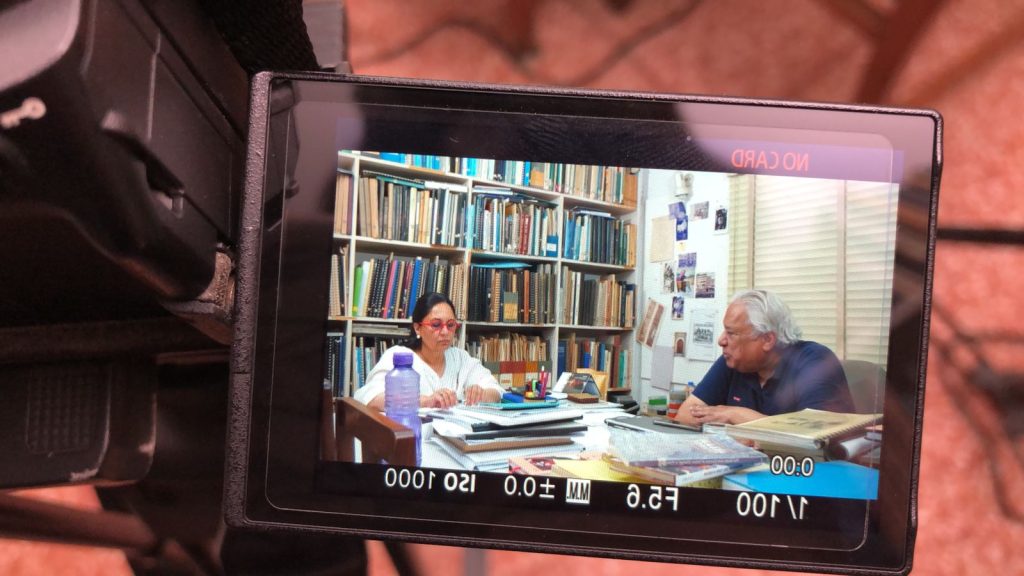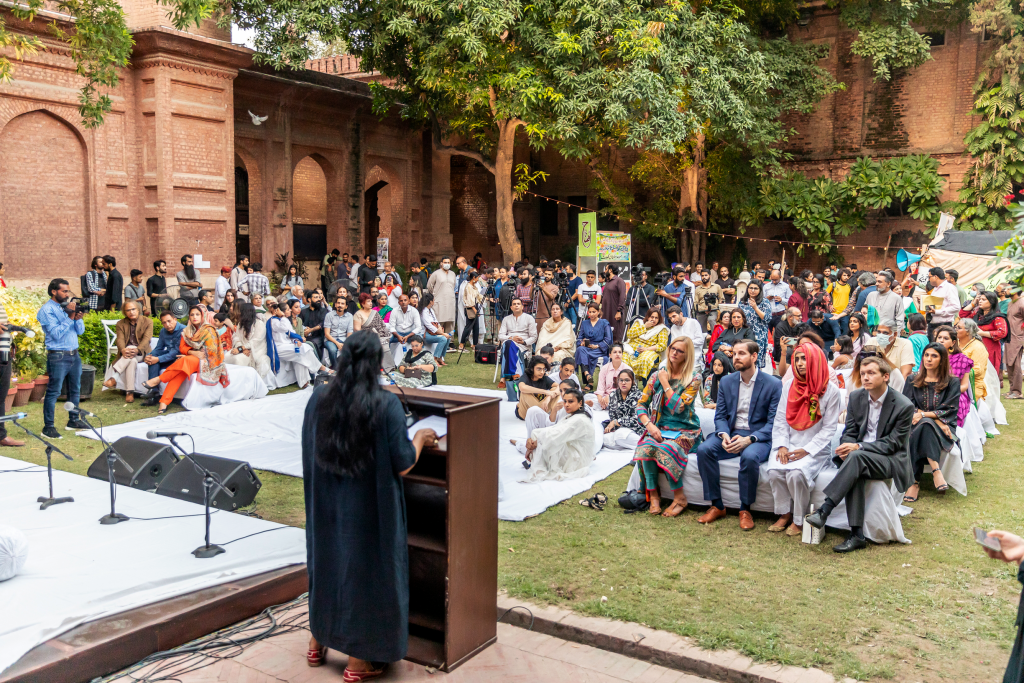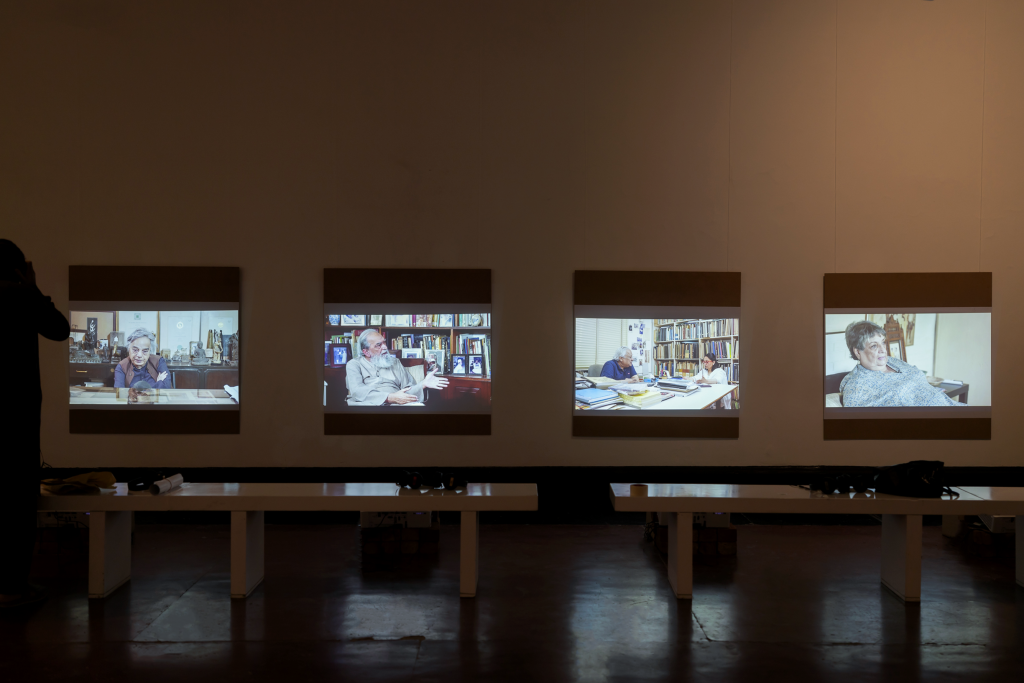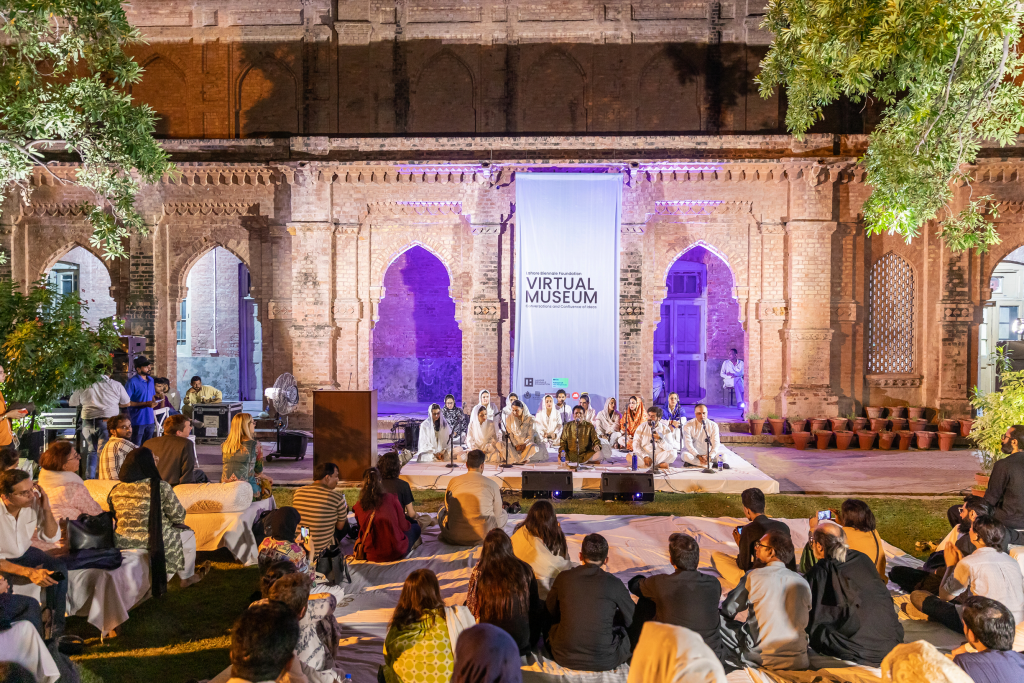LBF Virtual Museum | 75 Years of Cultural Histories of Pakistan
Public Project, Digital Repository, Virtual MuseumIn continuation of the public programming initiated by the Lahore Biennale Foundation (LBF) and in response to the new forming realities post C-19 pandemic, LBF is setting up a Virtual Museum: an online open source digital platform.
It is a Public Art Project based on new and archival research on cultural and artistic research – a platform for artists, creative practitioners and visitors to create projects that investigate their shared cultural heritage and the legacies of creative practice that have emerged from it, with place being a significant contextual frame.
New ways of experiencing and thinking about culture carved out by virtue of technological advances, will be utilized to reconnect the public with their heritage, while simultaneously allowing them to collectively create a new understanding of their current cultural landscape. The virtual museum will amplify local voices in a way its physical counterparts cannot do, as it lets local actors tell their own stories by creating digital representations to serve as emissaries of their cultural values – values that have evolved over time to have multiple meanings.
The LBF Virtual Museum encompassed the following components:
1. The Body & Beyond: Women Movements in Pakistan.
Curator: Farida Batool
This segment reflects on the birth and evolution of women’s movement in Pakistan. It engages with the development of a feminist consciousness and the shifts in feminist politics ranging from political resistance and public-reform based to taking up issues of sexuality and body politics in the public sphere. And, investigates the challenges confronting the contemporary Pakistan women’s movements and the role of arts as a protagonist.
This segment also engages with the themes of women’s access to civic spaces, the relationship between women and the state, religion and feminism, cultural notions of women and its effect on the debate around bodily autonomy. A meditation on the legacy of women’s movements and feminist activism in Pakistan over the course of the last 75 years.
Curator: Masooma Syed
This segment explores the plurality in the postcolonial identity. As nation states and cultures evolve, the idea of postcolonialism becomes of critical importance, as both states and cultures continue to reinvent themselves– physically, mentally, emotionally, and economically – in order to carve out a new path after being colonised. A hybrid identity exists in nations that have gone through the trauma of colonisation, which contains dual influences of the coloniser and the colonised.
Postcolonial art holds the potential to reveal much about the process of identity formation and could constitute critical starting points for the re-envisioning of postcolonial histories, as we live under the influence of new forms of colonisation – religious ; political-ideological(ies), geographical & military responses, especially as the influence of foreign power increases both directly and indirectly.
This segment is primarily a reflection of 75 years of Pakistan – then and now; a glance at the making of modern art schools – the significance of tea houses, Adbi baithaks, and the role of academic institutions on the Mall road and the making of the new movements and shifts in arts within Pakistan, the region and diaspora.
3. Architecture through Time and Space.
Curator: Tanvir Hasan
This segment examines the evolution in architectural practises with reference to both built and unbuilt spaces, and how architecture influences our lived experience; cultural nuances; and civic sensibility. And, investigates the lasting effects of colonisers on architectural practises, and their desire to leave a lasting legacy to mark their time.
This segment also examines the movements and shifts in architecture and how its current modalities have evolved to and exist in the present time. It charts the architectural response to rapid urban development– now that climate emergencies have made the need for sustainable living a fixed reality, and the struggle of old and new practises to achieve sustainable growth. This segment also engages with the role of decolonisation and democratic architecture in urban spaces.
4. Manduva: Exploring What We Won’t Like to Call ‘Lollywood.’
Curator: Sarmad Khoosat
This segment will engage with the interlocking movements and shifts within the realms of Pakistani cinema, drama, theatre and dance in relation to the cultural, religious, state and political nuances over the last 75 years.
It will examine various themes, including: the decline and revival of cinema & drama– the divergent paths of the film and drama industry, censorship and cinema, and the rise of independent films and artistic projects.
This segment will also investigate the legacy of the performing arts in Pakistan, by exploring further themes such as: the dying tradition of the Bhand, street theatre and political dissent, infamous night theatres/stage plays & the mujra dances – obscenity or art?– the role of the transgender community within the dance tradition, and the legacy of traditional dance forms in Pakistan. In essence, this segment shall be a meditation on the evolution of local cinema, drama, theatre and dance, and their present state.
5. Dastan-I-urdu: The Story of Urdu literature in Pakistan.
Curator: Ali Usman Qasmi
Co-Curator: Mahmood ul Hasan
This segment reflects on the legacy and evolution of storytelling in Pakistan, and all its varying forms. The oral tradition of dastangoi, the role of literature in imaging the identity of the nation, the development of postcolonial literature, contemporary Pakistani anglophone literature, and the cultural politics of language and its effect on literature.
This segment also examines the role of literature in decolonising the imagination, postcolonial diaspora literature, folklore and the creative mythology of Pakistan. And it investigates the role of literature in catalying political resistance in Pakistan, the confluence between art and literature and role of the arts in shaping the literary landscape, along with analysing the movements and shifts in urdu and english language literature in Pakistan.
Open Call for Research Collaborators (Photo Essays) for this component can be accessed at this link.
6. Ilm-e-Mosiqui : Pakistani Classical and Folk Music.
Curator: Sarah Zaman
This segment will pay homage to the rich history of musical legacies and emerging contemporary forms in Pakistan. Various genres of musical expressions (its insularity, teaching system, khayal practises, sanctity of raga time-cycles and gharana loyalties) as well as the craft of instrument making will be explored. Musicologists tend to experiment with their art which can be seen by some as defiance while it leads to formation of new forms of expression; while the audience will go on a historical tour of contributions of pioneers of the classical and folk music through demonstrations, talks, workshops or panel discussions and further upon the conversation by looking at emerging contemporary forms like pop-folk fusion and neo-Sufism.
As Chaitanya Kunte, musicologist and harmonium player, says, “In the last century, few musicians have paved a path that amalgamates tradition and new thought”, the role of practitioners as change makers within the context of changing political scenarios – as rebel, reformers or interpreters, will also be discussed.
About Farida Batool
Curator : Women’s Movements of the 80s: Then and Now
Farida Batool is an independent artist who explores Pakistan’s political upheavals and tumultuous history. Her research interests are new media, masculinity, visual cultural theory, and city and public spaces. She is currently teaching and heading the Department of Cultural Studies at National College of Arts, Lahore, and has authored a book, Figure: the popular and the political in Pakistan. She is an active member of Awami Art Collective working in public spaces. She presented papers and presentations at international conferences and workshops including Yale University USA; Society for Cinema and Media Studies, Montrel, Canada; Oxford University, St. Joseph’s University Philadelphia and many more.
She has exhibited extensively in many international and local solo and prestigious group shows. She is an active member of Awami Art Collective which aims to use art in public spaces to generate a discourse of peaceful co-existence.
About Masooma Syed
Curator: Post Colonial and Parallel Histories in Art Practices in South Asia
Masooma Syed is a visual artist from Pakistan but worked and lived for many years in different countries of South Asia. This makes her art trajectory unusual as an artist and as an art educator.
Syed’s art practice involves intricate processes of materials and making with hand, layered ideas of reality, society, fiction, and multiple narratives of human life. Her personal history shapes the aesthetics and politics of the materials she uses. Her visuals are a conundrum where kitsch is celebrated, the convention is flouted and slickness is derided. There is dismissal and protest, in the use of thrown away, discarded, inexpensive, and leftover materials.
She Practiced and taught art in several universities and art schools across South Asia; such as like National College of Arts, Pakistan, School Of Culture And Creative expressions, Ambedkar University, Delhi, Kathmandu University, Nepal, Swami Vipulananda Institute Of Aesthetics, University of Batticaloa, SriLanka. She is the recipient of Commonwealth Fellowship of Art and craft, University of New South Wales, Australia-HAT, Here and There, Art and craft fellowship, Manchester University, and several International artist residencies.
Her works are exhibited widely and internationally. Some noticeable are at the Kiran Nadar Museum of Art, Delhi, Lahore Art Biennale 01 ,Devi Art Foundation, New Delhi, Fukuoka Asian Art Triennial, Japan; Harris Museum, Black Burn Museum, England, Metropolitan Museum Tokyo, Apex Art, New York, and Kunsthalle Fridericianum, Kassel, Germany, Dubai Art Fair, and at the NGMA, Mumbai. She exhibited in Rohtas Art Gallery, Lahore, Gallery Ske, Delhi/ Bangalore, Vadehra Art Gallery Delhi, and Red Dot in Colombo.
About Tanvir Hasan
Curator: Architecture through Time and Space
Tanvir is an accredited conservation architect with extensive experience of conservation and regeneration. She is the Deputy Chairman of Donald Insall Associates, one of the United Kingdom’s leading conservation practices. Her work focuses on the conservation of historic fabric and managing change within sensitive heritage sites. She has worked extensively on Scheduled Monuments and World Heritage sites in the UK and her many conservation projects include award-winning schemes along London’s Regent Street and North Audley Street.
She is currently working with the World Monument Fund in Iraq and Kurdistan. There her projects focus on reinstatement of lost memory through conservation and sensitive regeneration, as part of post- conflict reconstruction, and include most of the ongoing restoration of Mosul Museum destroyed by ISIS in 2015.
Tanvir has worked extensively in Pakistan; she has taught at the National College of Arts and is a founding member of the Lahore Conservation Society. She has lectured on conservation, regeneration and sustainability at the Bartlett Faculty of the Built Environment London University, the Graduate School of Design Harvard. She is member of Historic England’s London Advisory Committee, sits on the Fabric Committee of the Albert Hall London, to advise on the conservation of this historic Victorian Hall.
About Ali Usman Qasmi
Curator: Legacy of Storytelling and Contemporary Literature in Pakistan and the Diaspora
Born and raised in Lahore, Ali Usman Qasmi is a historian of modern South Asia. He has published extensively in his area of expertise, including two monographs – Questioning the Authority of the Past: The Ahl al-Quran Movements in the Punjab, and The Ahmadis and the Politics of Religious Exclusion in Pakistan (winner of Karachi Literature Festival Peace Prize). Along with several journal articles and chapters in academic works, he has co-edited three volumes, including Muslims Against the Muslim League: Critiques of the Ideas of Pakistan. He has previously been the recipient of the Newton International Fellowship for postdoctoral research. Since 2012, Qasmi has been teaching history at the LUMS University’s School of Humanities and Social Sciences.
About Sarmad Sultan Khoosat
Curator: Manduva: Exploring What We Won’t Like to Call ‘Lollywood’
Sarmad Sultan Khoosat is a trailblazing Pakistani director, actor, producer & screenwriter, taking Pakistan to Cannes, Busan & beyond. As a director, he is best known for his feature films: Zindagi Tamasha (which won the top prize at Busan Film Festival in 2019 and was Pakistan’s official submission to the 93rd Oscars) and Manto (which received tremendous critical acclaim internationally). As a producer, Sarmad & Khoosat Films made history when Joyland became the first Pakistani feature length film to screen at Cannes & win the Jury Prize in Un Certain Regard. With a career spanning 20+ years, Sarmad has directed some of South Asia’s most celebrated Film & TV projects, such as Manto, Humsafar & Shehr-e-Zaat. In 2017, he was awarded the prestigious Pride of Performance Medal (one of the highest civilian awards conferred by the President of Pakistan) for his outstanding contribution to Pakistan’s Film & TV industry.
About Sarah Zaman
Curator: Ilm-e-Mosiqui: Pakistani Classical and Folk Music
For over four decades, Sarah Zaman trained in South Asian Classical Music under the tutelage of renowned classical music maestros, eventually leading her to a number of solo performances overseas. Within Pakistan, apart from local concerts, Zaman regularly performs at the Annual All Pakistan Music Conference; where she is received with much applause and appreciation. She was recently included in the Womens’ Action Forum’s (WAF) Tribute to the Multifaceted Talent of the Women of Pakistan slide show. In 2000, Zaman was appointed consultant at the National College of Arts (NCA), and successfully initiated the idea and partnered with other key musicologists to plan, execute, and manage the first-ever department of musicology in Pakistan. She is currently the only founding member still serving the cause of music at the NCA as she has done so for the last sixteen years with selfless conviction. A true artist, Zaman also worked as the first Creative Director of Kayseria between the years 2006 till 2010, in the crucial years of its infancy.
Project Advisors: Prof. Iftikhar Dad, Naazish Ata Ullah, & Raza Ali Dada.
The Lahore Biennale Foundation is partnering with the British Council to develop the LBF Virtual Museum.




